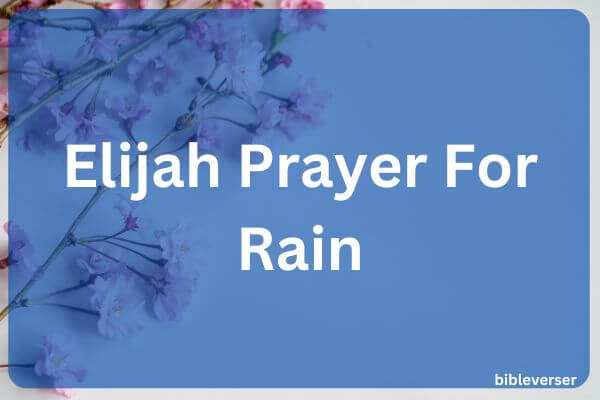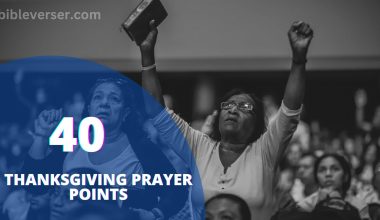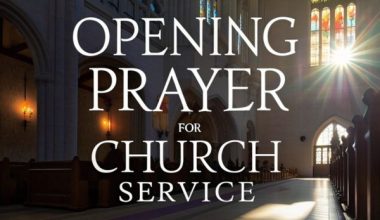Elijah Prayer For Rain
The story of Elijah praying for rain is one of the most profound examples of the connection between faith, obedience, and the power of prayer.
Elijah was a prophet of God during a time when Israel was deep into idol worship, particularly the worship of Baal. This narrative is about much more than just rain it’s about repentance, God’s judgment, and His mercy.
To understand this story fully, we need to walk through it step by step, taking time to see the reasons behind Elijah’s actions and how everything unfolds.
Why Did Elijah Pray for the Rain to Stop?
The prayer for the rain to stop wasn’t just a random request from Elijah. The reason was tied to Israel’s spiritual state at the time. King Ahab, who ruled over Israel, had led the nation into deep sin by allowing the worship of Baal, a Canaanite god that people believed controlled fertility and the weather.
This meant they thought Baal could bring rain and ensure their crops grew. This was a serious issue because, in turning to Baal, the Israelites were abandoning the one true God, Yahweh, who had brought them out of Egypt and made them His chosen people.
Elijah’s prayer for the rain to stop was rooted in obedience to God’s covenant with Israel. In Deuteronomy 11:16-17, God had warned the people that if they turned away from Him and worshipped other gods, He would “shut up the heavens so that it will not rain.” So, when Elijah prayed for the rain to stop, he was calling on God to remind the people of the consequences of their disobedience. It was a way of showing them that Baal had no power to bring rain it was God who controlled the rain, and He would hold it back until they repented.
In 1 Kings 17:1, Elijah boldly declared to King Ahab, “As the Lord, the God of Israel, lives, before whom I stand, there shall be neither dew nor rain these years, except by my word.” This declaration kicked off a three-and-a-half-year drought. It was a direct challenge to Baal worship and a sign that the true God of Israel was in control.
What Happened During the Time of No Rain?
The drought that followed Elijah’s prayer caused severe consequences for Israel. For three and a half years, the land experienced no rain (James 5:17). This had devastating effects, both physically and spiritually.
Here are some of the key things that happened during that time:
Elijah is Fed by Ravens (1 Kings 17:2-6): After declaring the drought, God told Elijah to go east and hide near the Brook Cherith. Despite the famine, Elijah drank from the brook, and God miraculously sent ravens to bring him bread and meat every day. This shows how, even in times of judgment, God takes care of His faithful servants.
The Widow of Zarephath (1 Kings 17:7-16): When the brook dried up because of the drought, God sent Elijah to a widow in Zarephath. She was preparing to cook her last meal for herself and her son before they expected to die of starvation. But Elijah, under God’s direction, asked her to first make him some bread. In faith, she obeyed, and God miraculously multiplied her oil and flour so that they had enough to eat until the drought ended. This miracle shows how God provides for those who trust Him, even in the hardest of times.
The Raising of the Widow’s Son (1 Kings 17:17-24): During his stay with the widow, her son fell ill and died. Elijah prayed to God, and God revived the boy. This event was not only a miracle but also a foreshadowing of the greater spiritual revival God would bring to the people of Israel after the drought.
Elijah on Mount Carmel (1 Kings 18:20-39): This is probably the most famous event during the drought. God instructed Elijah to confront King Ahab and challenge the prophets of Baal on Mount Carmel. In front of the people of Israel, Elijah had a contest with the prophets of Baal to see whose god could bring down fire from heaven.
Despite their loud prayers, dancing, and even self-harm, Baal’s prophets failed. But when Elijah prayed a simple prayer, fire from the Lord fell from heaven and consumed the offering on the altar. This dramatic event led the people to declare, “The Lord, He is God!” (1 Kings 18:39). This turning point was key because it marked the beginning of Israel’s return to the true God.
Why Did Elijah Pray for the Rain to Return?
Once the people acknowledged that Yahweh was the true God, the purpose of the drought had been fulfilled. The drought wasn’t meant to be a permanent punishment, but rather a way to bring Israel to repentance.
After the showdown on Mount Carmel, when the people turned back to God, it was time for the rain to return. Elijah knew that the rain was a symbol of God’s blessing and mercy, and that its return would signify the restoration of the relationship between God and His people.
In 1 Kings 18:41, Elijah told King Ahab, “Go, eat and drink, for there is the sound of a heavy rain.” This was a statement of faith, for at that moment, there was no visible sign of rain. But Elijah knew that God had accomplished His purpose through the drought and that the rain was coming.
Elijah’s Exact Prayer
Elijah went to the top of Mount Carmel to pray for the rain to return (1 Kings 18:42). His prayer was not casual or quick. The Bible tells us that Elijah “bent down to the ground and put his face between his knees” a posture that shows deep humility and earnestness. He was pleading with God to fulfill His promise and send rain.
Elijah’s prayer wasn’t answered immediately. After each prayer, he sent his servant to look toward the sea to see if there were any signs of rain. Six times the servant came back with the same report: nothing.
But Elijah didn’t give up. He continued to pray with the same intensity and faith. Finally, after the seventh time, the servant reported seeing “a cloud as small as a man’s hand” rising from the sea (1 Kings 18:44). Even though it was a small cloud, Elijah knew that God had answered his prayer.
Soon, the sky grew black with clouds, the wind rose, and a heavy rain began to fall (1 Kings 18:45). This was after three and a half years of drought, and it showed the power of persistent prayer and faith in God’s timing.
Conclusion
Elijah’s prayers for both the drought and the rain teach us several important lessons about faith, obedience, and the power of prayer. His prayer for the rain to stop was a response to Israel’s disobedience and idolatry.
The events that occurred during the drought, such as his provision by the brook, the miracles in Zarephath, and the confrontation on Mount Carmel, were all ways that God worked through Elijah to bring the people back to Him.
Finally, Elijah’s persistent prayer for rain shows us that God is faithful to answer prayer, but sometimes it requires patience and perseverance. Elijah’s story reminds us that God controls not only the natural world but also the spiritual climate of our lives. When we align our prayers with His will, we can trust that He will respond in His perfect timing.







